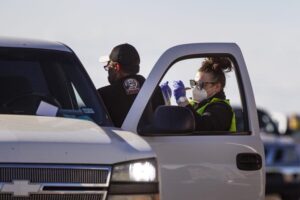It’s unknown how long the COVID-19 vaccines will stay effective, but local doctors say it’s still a good idea to get the shot and take precautions.
Recently, White House Chief Medical Advisor Dr. Anthony Fauci said people may need to get booster shots, the CNBC website said. Dr. Rohith Saravanan, chief medical officer at Odessa Regional Medical Center, and Dr. Timothy Benton, regional chairman, associate dean for clinical affairs and professor at Texas Tech University Health Sciences Center, discussed vaccine effectiveness with the Odessa American.
“The current answer is we don’t know exactly how long it’s effective for,” Saravanan said. “The vaccine is basically giving you the ability to create an antibody against one spike protein on the virus surface.
“There are multiple proteins on the virus’s surface, but we are creating an antibody against one protein. That antibody helps identify the virus in our body so our white blood cells can then destroy the virus. That’s how the antibody works. So as long as that one spike protein on the viral surface does not change, the vaccine will continue to be effective.
“The way that viral spike protein can change is that with all these variants we’re seeing, we see a variant of the virus with that spike protein,” Saravanan said. “Then this antibody no longer can identify that virus. Until that time, we won’t know how long the vaccine lasts. That’s the true scientific answer, so the best way to explain it to people is that we won’t know it’s not effective anymore and we’ll need a booster for it.”
As soon as new variants start coming out and are being identified, Saravanan said, companies that make vaccines will start creating countermeasures.
“They start identifying those variants and creating a vaccine that can affect those variants,” he said. “So far, most of the variants that have come out have not changed that one spike protein that our vaccines are effective against.
“Pfizer is against one those spike proteins; Moderna is against another one. So far, the variants have not changed those spike proteins, so our vaccines currently work against all of those different variants. But companies are always working on new things and as soon as we see something new that it doesn’t work against, then the companies will have the booster for those, probably within weeks of identification of that variant.”
Saravanan said if you get infected by the virus, despite the fact that you have a vaccine, you are going to go into isolation.
“If we identify a variant in the community that we know that the vaccine doesn’t work against and it’s rampant, you get exposed to it and we know that even though you’ve been vaccinated, that vaccine doesn’t work against that variant that we’ve identified,” he said. “Then you would be in quarantine at that point in time. That hasn’t happened so far, but it could.”

Benton agreed that it’s not known what the long-term immunity from the vaccine is because it hasn’t been around that long.
“… There was a study in the December New England Journal of Medicine about the … antibodies in people after immunization, and they demonstrated in there that after three months there was some decline in the amount of antibodies present. But (it was) still relatively high numbers so it’s not like it went to zero. … The studies are ongoing. When we get nine months out from having given vaccine, then we can test antibody levels and see where they are,” Benton said.
He added that the Centers for Disease Control and Prevention quarantine recommendation has changed, so if you are exposed and have been vaccinated you don’t have to quarantine.
“On the flip side, the CDC says if you are vaccinated to take the appropriate precautions because we don’t know just yet how long the immunity will last,” Benton said.
He cited the flu vaccine as an example of one that many people get every year and said there are other vaccines that offer longer lasting immunity like human papillomavirus virus or the polio vaccine.
“We just don’t have enough history with SARS-CoV-2 to know how long that immunity’s going to last from the vaccine or from a natural immunity. I think it’s encouraging that we haven’t had really high numbers of repeat infections,” Benton said. “Those people who have had the disease, there are not high numbers of reported reinfection. However, we have to be careful when we say that, too, because there could have been reinfections that we just don’t know about.”

With a fair number of people vaccinated in the community, there seem to be fewer cases, Benton said.
“The general observations are very positive with the vaccine. There seem to be empiric evaluations of declining numbers. You can look at our community. We’re in much better shape after the virus has naturally infected a number and a fairly significant number of the population has been vaccinated. So the cases are declining, but that’s anecdotal, or observational, or not necessarily scientific. But I’m encouraged even from that initial study that was in December that even though the antibodies declined in some people, it was declining at a relatively low rate,” he added.
Saravanan said there are two reasons to wear masks after vaccination. One is personal and the second is community. Since this interview, the Centers for Disease Control and Prevention has said it’s OK not to wear in most indoor or outdoor settings and the Pfizer vaccine has been given emergency use authorization for children 12 to 15.
“The personal reason is that COVID-19 vaccines are effective. However, a small percentage of people who are fully vaccinated will still get COVID if they are exposed to the virus,” Saravanan said. “That’s called vaccine breakthrough cases. … We say the vaccine is 95 percent effective, but what about the other 5 percent? So those other 5 percent can still get sick because they did not gather up the antibodies that the vaccine was supposed to help them gather. So you could still get it. That’s one of the reasons to wear a mask. …
“The second reason is the community reason. The community reason is that once you have immunity against a virus, those antibodies are in your blood which means if the virus enters you bloodstream your antibodies will immediately go to work and destroy that virus but it does not stop the virus from entering your nose, your mouth your lungs. So you could still be carrying the virus in your mucosal surfaces — in your nose, in your mouth and your lungs,” Saravanan added.
He said even though you won’t get sick and if the virus gets in your antibodies it will be destroyed, you could still be carrying it in your nose and your mouth.
“If you cough or sneeze on someone else that’s not vaccinated they could catch the virus from you. That’s the reason you still continue wearing a mask for the community,” Saravanan said.
If you are outdoors and you can maintain a safe distance from people, you don’t need to wear a mask. If you are indoors, you always need to wear a mask because by definition you can’t maintain good distance from people.
If you haven’t been vaccinated, even if you can distance yourself from people indoors you should wear a mask. If you have been vaccinated and you’re indoors with other vaccinated people, it’s OK not to wear a mask.
“Unfortunately, there are going to be some people who need a little more convincing than other people,” Saravanan said. “The vaccines are extremely safe. We know this because we are seeing it even in the news. Remember the recent time when the Johnson & Johnson vaccine was pulled out for a period of time and then it was reintroduced?
“The Johnson & Johnson vaccine had been given to 6 million people. There were six women between the ages of 18 and 48 who got clots in their brains. They did not know whether it was related to the vaccine or not, so they immediately stopped giving that vaccine out and they said we need more information. We need to collect more data.
“We need to analyze the data some more. Six million people and six people got a clot. That’s much less probability than pretty much everything else we do in life; even walking on the road there’s a higher possibility that you’ll get hit by a car at that kind of statistic so the fact is they are extremely careful with vaccines.
“Even if they slightly believe that a vaccine could cause harm, they absolutely will stop it and they will do more research. Once they did the research, it took them 11 days to collect all the information. They collected information for the full 11 days analyzed all the information and then the CDC and the FDA came together and said we are satisfied that this is not a causal relationship. The vaccine did not cause the clot. Yes, there’s a correlation, so we’ll let people know that there’s a correlation, but the risk is much, much lower than the benefit of the vaccine. Therefore, we will release the vaccine again,” Saravanan said.




